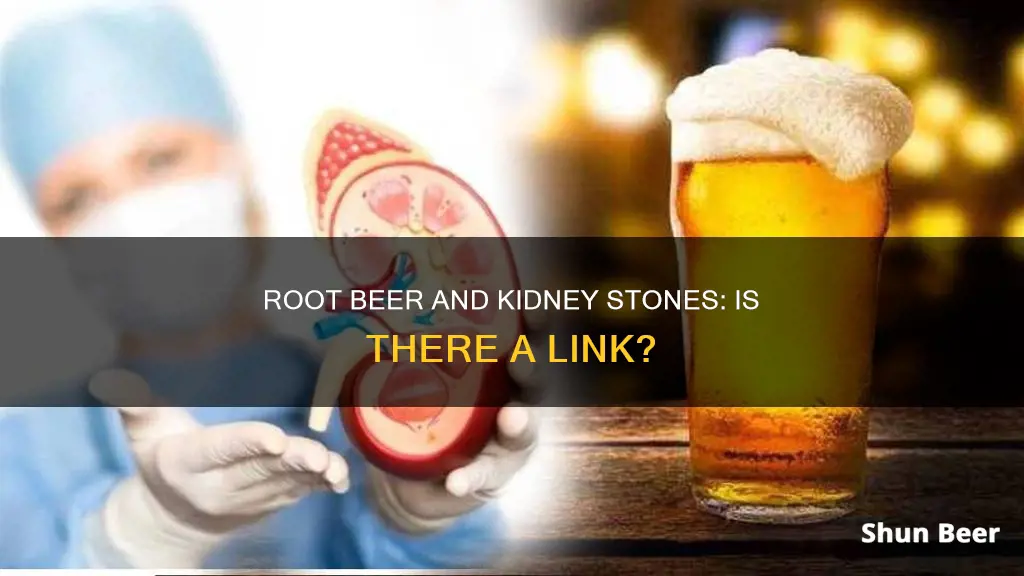
Drinking root beer has been linked to an increased risk of kidney stones, according to some studies. While the evidence is not entirely conclusive, research suggests that sugar-sweetened beverages, including root beer, may elevate the likelihood of kidney stone formation. This association is attributed to the presence of fructose in these drinks, which increases the excretion of calcium, oxalate, and uric acid—all contributors to kidney stones. However, it's important to note that artificially sweetened drinks did not exhibit a significant impact on kidney stone risk in the same studies.
| Characteristics | Values |
|---|---|
| Does drinking root beer cause kidney stones? | Drinking root beer does not directly cause kidney stones, but it can increase the risk of developing them. |
| Risk factors | Sugar-sweetened beverages, including root beer, are associated with a higher risk of kidney stone formation due to their fructose content. |
| Protective factors | Drinking water, coffee (caffeinated and decaffeinated), tea, wine, beer, and orange juice is associated with a lower risk of kidney stone formation. |
| Symptoms | Pain when urinating, nausea, frequent urination, fever, chills, and fluctuating pain intensities. |
| Treatment | Passing kidney stones without surgery is possible by increasing fluid intake, but not all fluids are equally beneficial. |
What You'll Learn
- Root beer contains fructose, which increases excretion of stone-causing substances
- Phosphoric acid in some sodas may cause kidney stones
- Soda is a diuretic, which can increase salt content in urine, promoting kidney stones
- Drinking water after soda may decrease the risk of kidney stones
- Drinking coffee, tea, wine, beer, or orange juice is associated with a lower risk of kidney stones

Root beer contains fructose, which increases excretion of stone-causing substances
Root beer often contains sugar in the form of fructose. While drinking lots of liquids is recommended to ward off kidney stones, not all drinks are equally beneficial. In fact, some drinks can increase the risk of kidney stone formation.
Fructose has been found to increase the urinary excretion of calcium, oxalate, and uric acid, which are substances that contribute to kidney stone formation. A study published in the Clinical Journal of the American Society of Nephrology found that participants who drank at least one sugar-sweetened cola per day had a 23% higher risk of developing kidney stones than those who drank less than one can a week.
The study also found that other sugar-sweetened drinks, such as non-cola sodas and punches, were associated with a higher risk of kidney stone formation. On the other hand, drinks like coffee, tea, wine, beer, and orange juice were associated with a lower risk of kidney stones.
Therefore, it is important to be mindful of the types of beverages consumed, as some may increase the risk of kidney stone formation due to their fructose content.
Beer and Pernide: Is It Safe to Drink Alcohol?
You may want to see also

Phosphoric acid in some sodas may cause kidney stones
Phosphoric acid in sodas, especially colas, may increase the risk of kidney stone formation. Phosphoric acid is known to acidify urine, creating an environment that is conducive to stone formation.
Cola beverages are generally acidified with phosphoric acid, whereas non-cola carbonated beverages are predominantly acidified using citric acid. Laboratory studies have shown that high-phosphorus diets can cause nephrocalcinosis in rats, and diets high in phosphate may increase plasma phosphorus levels.
A study found that kidney stone patients who abstained from soda, specifically colas acidified with phosphoric acid, reduced their risk of recurrence by about 15%. Another study found that participants consuming one or more sugar-sweetened colas per day had a 23% higher risk of developing kidney stones compared to those consuming less than one can a week.
While the evidence is not concrete, it suggests a link between the consumption of phosphoric acid in sodas and an increased risk of kidney stone formation.
Beer and Dieting: Can You Have Your IPA and Drink It?
You may want to see also

Soda is a diuretic, which can increase salt content in urine, promoting kidney stones
While it is a myth that soda causes kidney stones, it is a diuretic that can increase the salt content in urine, promoting kidney stones. Soda, especially colas and pepper sodas such as Coke, Dr. Pepper, and Pepsi, contain phosphoric acid, which is the culprit in increasing the risk of kidney stones. The caffeine in soda also makes it a diuretic, causing the salt content in urine to rise and promoting kidney stones.
To decrease the risk of kidney stone formation, it is important to follow a soda with an equal amount of water to reduce the concentration of salt in the urine. Alternatively, one can avoid soda altogether and replace it with healthier alternatives.
Beer Traps: Effective Snail Control or Urban Myth?
You may want to see also

Drinking water after soda may decrease the risk of kidney stones
Drinking water is essential for preventing kidney stones, and it is even more crucial if you consume soda regularly. Soda, especially sugar-sweetened varieties, has been linked to an increased risk of kidney stone formation. However, staying hydrated by drinking plenty of water can help flush out the toxins that contribute to stone development.
The Link Between Soda and Kidney Stones
Research has found a connection between soda consumption and kidney stones. In a study involving 194,095 participants, those who drank sugar-sweetened colas had a 23% higher risk of developing kidney stones compared to those who drank less than one soda per week. This risk is attributed to the presence of fructose in sugar-sweetened beverages, which increases the excretion of calcium, oxalate, and uric acid—all contributors to kidney stone formation.
The Role of Hydration
While soda consumption can increase the risk of kidney stones, staying adequately hydrated may help counteract this effect. Water is crucial for flushing out toxins and keeping the urinary system healthy. It is recommended to drink enough water throughout the day to produce at least 2 liters of urine. This can help prevent the formation of kidney stones and reduce the risk of recurrence.
Other Beverage Choices
In addition to water, there are other beverage choices that may help reduce the risk of kidney stones. These include:
- Caffeinated coffee: lowers the risk by 26%
- Decaffeinated coffee: reduces the risk by 16%
- Tea: slashes the risk by 11%
- Orange juice: despite its high fructose content, it also contains potassium citrate, reducing the risk by 12%
- Wine: red wine lowers the risk by 31%, and white wine by 33%
- Beer: significantly reduces the risk by 41%
A Holistic Approach
While adjusting your beverage choices can help, preventing kidney stones requires a more comprehensive approach. It is essential to stay hydrated, but also to make dietary changes. Consuming a diet rich in plant-based foods and fiber can lower the risk of kidney stone recurrence. Additionally, limiting meat intake, choosing low-sodium options, and ensuring adequate daily calcium intake are crucial steps in maintaining optimal urological health.
Temporary Crowns and Beer: What You Need to Know
You may want to see also

Drinking coffee, tea, wine, beer, or orange juice is associated with a lower risk of kidney stones
Another study, which followed 194,095 people over eight years, found that drinking coffee, tea, beer, wine, and orange juice was associated with a lower risk of kidney stones. Beer reduced the risk of kidney stones by up to 41%, while wine (specifically white wine) reduced the risk by 33%. The study also found that sugar-sweetened colas and non-colas, fruit punch, and diet non-colas increased the risk of kidney stones.
Additionally, a study that investigated the association between alcohol consumption and kidney stones in American adults found no significant association between alcohol consumption and the prevalence of kidney stones, even among heavy drinkers. However, the study had some limitations, such as not specifying the type of alcohol consumed and the specific times of kidney stone occurrence.
Furthermore, current research suggests that drinking coffee may decrease the risk of developing kidney stones. A 2021 study through the National Kidney Foundation found that caffeine, whether in tea, soda, coffee, or alcohol, may decrease the risk of kidney stones. Another 2021 study showed that those who drank coffee or tea were less likely to develop kidney stones than those who didn't consume caffeinated liquids.
In summary, drinking coffee, tea, wine, beer, or orange juice is associated with a lower risk of kidney stones, according to the available research. However, it is important to note that excessive alcohol consumption is not recommended due to its negative health effects.
Beer and Blood Tests: Safe or Not?
You may want to see also
Frequently asked questions
While root beer contains fructose, which has been found to be associated with kidney stones, there is no evidence to suggest that drinking root beer directly causes kidney stones. However, consuming high amounts of sugar-sweetened beverages has been linked to a higher risk of kidney stone formation.
Fructose increases the urinary excretion of calcium, oxalate, and uric acid, which are substances that contribute to the formation of kidney stones.
Yes, several beverages have been found to be associated with a lower risk of kidney stone formation. These include caffeinated coffee, decaffeinated coffee, tea, wine, beer, and orange juice.







